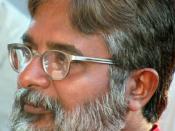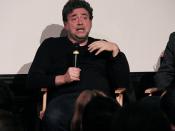Cinematographer A cinematographer, or director of photography, supervises all visual aspects of film, including lighting, artistic and technical characteristics of the picture, and sometimes the actual operation of the camera. He or she is in charge of producing a picture that is both aesthetically pleasing and technically correct. A cinematographer often works very closely with the director in order to capture the essence, mood, and purpose of the scene before the camera. He or she is present from pre- to post-production, contributing his or her ideas and decisions to bring about the best possible overall look and feel of a motion picture.
In order to pursue a career in cinematography, one must show a general interest, not only in film, but in the art of still photography as well. After all, the only real difference between cinematography and still photography is time. Gaining experience behind the lens is very valuable when it comes to filmmaking, regardless of the type of camera.
Basic photography courses can be taken as early as high school, and offers the film student the opportunity to get the basic feel behind the lens. Before capturing the light and art of moving picture, one must find his talent within a still frame first.
There are several courses of Film History and Appreciation that are very valuable to the blossoming cinematographer. Studying the style and techniques of other cinematographers can help one form his own unique signature behind the camera. These film classes also teach what is considered aesthetically pleasing or "correct" in the eyes of both the audience and the filmmaker. To become successful, a cinematographer needs to know what the viewers want to see.
The courses required for admittance into the film studies major include basic computer competency classes, oral communication, writing competency, film history, foreign-language...


